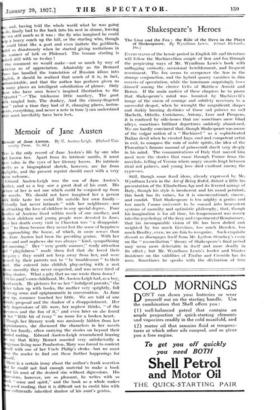Memoir of Jane Austen
emoir of Jane Austen. By E. Austen-Leigh. (Oxford Uni- versity Press. 7s. 6d.)
ni- is the only record of Jane Austen's life by one who had known her. Apart from its intrinsic merits, it must ve value in the eyes of her literary lovers. Its intrinsic nits as a biographical sketch, however, are far from eligible, and the present reprint should meet with a very an welcome.
Edward Austen-Leigh was the son of Jane Austen's ther, and as a boy saw a great deal of his aunt. His gum of her is not one which could be conjured up from r novels. We should not have imagined her a person th little taste for social life outside her own family— friendly but never intimate " with her neighbours—nor attracting the love of children in any special degree. Four males of Austens lived within reach of one another, and their children and young people were devoted to Jane. ter her death every visit to Chawton was " a disappoint- ut to them because they never lost the sense of happiness approaching the house, of which, in more senses than e, Jane Austen had been the presiding genius. With her Ts and and nephews she was always " kind, sympathising
d amusing." Her " very gentle manner," ready attention
d " playfulness " made them feel that she loved their apany ; they could not keep away from her, and were wed by their parents not to " be troublesome " to their at. She entered into childish play-acting with a zest ose sincerity they never suspected, and was never tired of ling stories. What a pity that no one wrote them down ! Of his aunt's own childhood, Mr. Austen-Leigh had, as a boy, dal much. He pictures for us her " indulgent parents," the flu her taken up with books, the mother very sprightly, full strong sense and epigrammatic in conversation. As Jane w up, romance touched her little. We are told of one finite proposal and the shadow of a disappointment. Her rly impressions of life were, her nephew thinks, " of the Mien and the fun of it," and even later on she found her " little bit of ivory " no room for a broken heart. Though her literary work was anxiously hidden from her quaintances, she discussed the characters in her novels th her family, often carrying the stories on beyond their hated ending. Edward Austen-Leigh remembered hearing r say that Kitty Bennet married very satisfactorily a rgyman living near Pemberton, Mary was forced to content "self with one of her Uncle Philip's clerks—but we must re the reader to find out these further happenings for 'self.
There is a certain irony about the author's frank assertion at he could not find enough material to make a book nit his aunt of the desired size without digressions. His scions, however, are so pleasant, he writes with so uch " sense and spirit," and the book as a whole makes eh good reading, that it is difficult not to credit him with me collaterally inherited shadow of his aunt's genius.






































 Previous page
Previous page